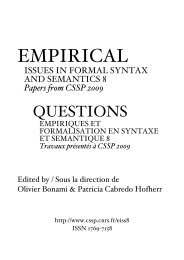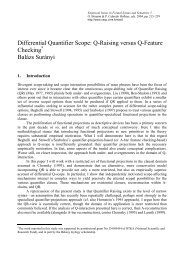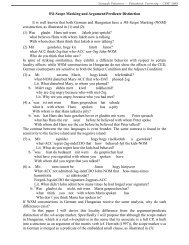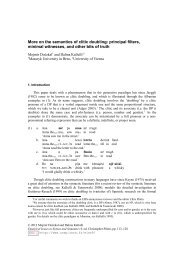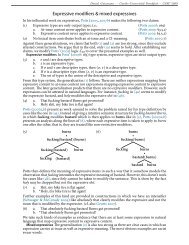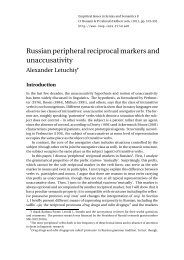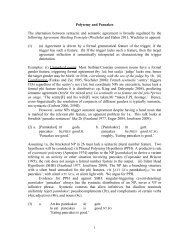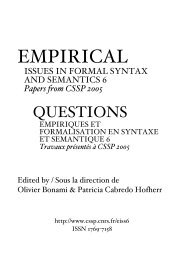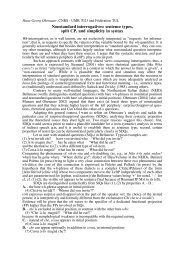Empirical Issues in Syntax and Semantics 9 (EISS 9 ... - CSSP - CNRS
Empirical Issues in Syntax and Semantics 9 (EISS 9 ... - CSSP - CNRS
Empirical Issues in Syntax and Semantics 9 (EISS 9 ... - CSSP - CNRS
Create successful ePaper yourself
Turn your PDF publications into a flip-book with our unique Google optimized e-Paper software.
2.3. Are there any restrictions on DCC <strong>in</strong> Ternois?<br />
The variety of contexts that license DCC is such, <strong>in</strong> particular for speakers that make an<br />
extensive use of it, that one may wonder whether any context excludes it. Judg<strong>in</strong>g from the data<br />
available so far, root declarative clauses host no que: unsurpris<strong>in</strong>gly, they display no DCC. Root<br />
WH-questions <strong>and</strong> exclamations, which also exhibit a doubly filled complementizer <strong>in</strong> Ternois,<br />
are potential c<strong>and</strong>idates for DCC: I have found no case <strong>in</strong> corpora so far with a left-peripheral<br />
XP follow<strong>in</strong>g que: XPs that are not clause-<strong>in</strong>ternal are either to the left of the WH-P or to the<br />
right of the VP. 14 The root-status of the few cases that may qualify for DCC is notoriously<br />
unclear: this <strong>in</strong>cludes quotation clauses, <strong>and</strong> clauses headed by a modal adverb followed by que<br />
(‘maybe that’, ‘hopefully that’), where <strong>in</strong> st<strong>and</strong>ard French subject clitic <strong>in</strong>version occurs.<br />
Moreover, non-f<strong>in</strong>ite clauses do not allow for que nor for a doubled de, the <strong>in</strong>f<strong>in</strong>itive<br />
complementizer. So far, the right generalization is the follow<strong>in</strong>g: DCC can occur <strong>in</strong> all<br />
embedded clause licens<strong>in</strong>g the complementizer que – which, <strong>in</strong> Ternois, amounts to: DCC can<br />
occur <strong>in</strong> all embedded tensed clauses (but see §4 for two strik<strong>in</strong>g exceptions).<br />
3. The range of ‘s<strong>and</strong>wiched XPs’<br />
In a parallel way, most languages <strong>in</strong> which some sort of DCC has been described so far<br />
impose restrictions on the XP that may occur between the two <strong>in</strong>stances of the complementizer.<br />
These constra<strong>in</strong>ts are not found <strong>in</strong> Ternois.<br />
3.1. Heav<strong>in</strong>ess<br />
For Irish English, McCloskey (2006) only discusses high adjuncts, which seem to be the<br />
only k<strong>in</strong>d of XP occurr<strong>in</strong>g between the two C positions, <strong>and</strong> which are preferentially required to<br />
be ‘heavy’ <strong>in</strong> order to trigger DCC. In Ternois, doubled Cs can frame a rich set of items, among<br />
which are adjuncts. Heav<strong>in</strong>ess is irrelevant: ‘s<strong>and</strong>wiched’ XPs can be monosyllabic, as is the<br />
case for the (doubled) subject l’heur <strong>in</strong> (10a) or for the adjunct d’man <strong>in</strong> (10b):<br />
(10) a. dù qu’ nous irons / Tertous, qu<strong>and</strong> qu’ l’ heur’ qu’ all’ s’ra sonnée (R122)<br />
where that we go.FUT / all, when that the hour that she be.FUT rung<br />
’where we will all go when the time (that it) has come’<br />
b. Qui sait si, d’man, qu’ a’ n’ mettront pon / E<strong>in</strong> couverque (R94)<br />
Who knows whether, tomorrow, that they put.FUT NOT / a lid<br />
‘Who knows whether, tomorrow, they won’t wear a lid’<br />
3.2. ‘Front<strong>in</strong>g’ versus clitic left dislocation<br />
The Dutch data analyzed by Hoekstra (1993) show that only objects that are not echoed by<br />
a clitic can st<strong>and</strong> before dat, as <strong>in</strong> (11a), while clitic left dislocated XPs, as <strong>in</strong> (11b), cannot:<br />
(11) a. Ik denk [dat Jan dat ik niet ga feliciteren] (Hoeksema’s 27a)<br />
I th<strong>in</strong>k that Jan that I not go congratulate<br />
b. *Ik denk [dat Jan dat ik die niet ga feliciteren] (Hoeksema’s 26a)<br />
I th<strong>in</strong>k that Jan that I him not go congratulate<br />
14<br />
Fieldwork <strong>and</strong> additional corpus work are planned to check whether the data are fully representative.<br />
82



